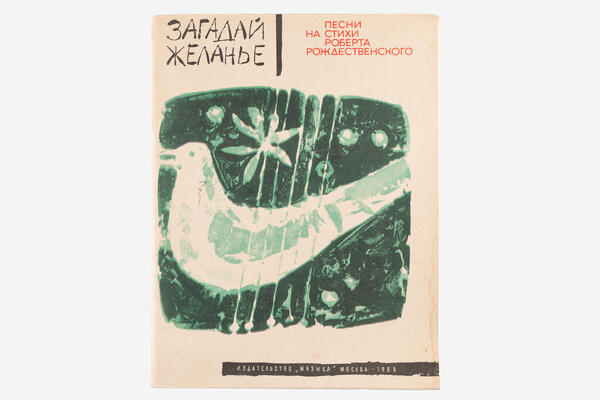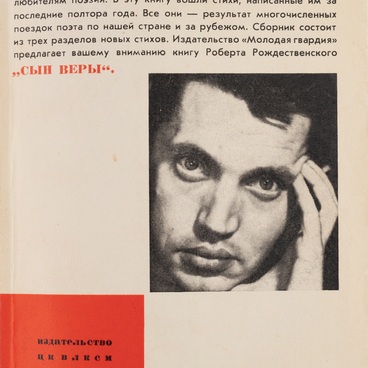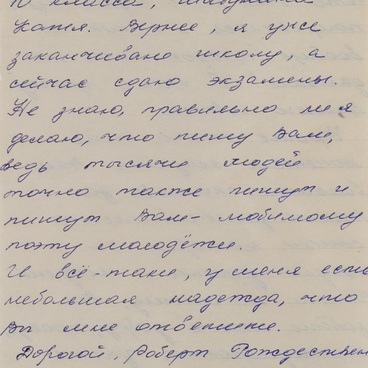Robert Rozhdestvensky gained national fame primarily as a songwriter. More than 600 of his poems became famous songs and were loved by people all over the country. Among these are “Echo of Love”, “Farewell Waltz”, “Behind the factory outpost” and many others. The first collection of songs called “Make a Wish” for voice and piano with lyrics by Rozhdestvensky was published in 1969 by the publishing house “Music”. Twenty thousand copies were published.
Rozhdestvensky collaborated with numerous famous composers. Among his co-authors were Arno Babajanian, Aleksandr Flyarkovsky, Mark Fradkin, Oscar Feltsman, Vladimir Shainsky, and others. Together they created musical compositions that were mostly intended for the Estrada Artists (stage performances), but at the same time were designed for highly professional vocalists.
The history behind the song “The attraction of the Earth”, which is included in the collection, is quite unique and interesting. Rozhdestvensky worked on this song together with David Tukhmanov. The composer was not satisfied with the text. The words did not fit the melody exactly as he wanted, so Tukhmanov called Rozhdestvensky, who was in Jūrmala (a resort city in Latvia), every day and kept asking to rewrite one line or another. It was very difficult for the poet. Rozhdestvensky said multiple times: “Enough. I can stand no more, I’ll quit!” Nevertheless, he was persuaded to continue working on the words. As a result, Lev Leshchenko made this song popular and it has been playing around the country for more than 40 years.
The poet was well aware of his listeners' preferences. Two leading motifs are typical for Rozhdestvensky’s songs: the heroic one (“For that guy”, “Comrade Song”, “Big Sky”, “A Moment”) and the lyrical one (“Become this way”, “Thank you”, “Song of the Distant Homeland”, “Call me”). Rozhdestvensky also often turned to the genre of ballads and hymns.
The poet was often asked to write soundtrack lyrics. In total, he composed 37 songs for 28 films that became classics of the Soviet cinema. Those include “Only Old Men Are Going to Battle”, “Seventeen Moments of Spring”, “Fate”, “Carnival”, “The Elusive Avengers’ trilogy”, “How the Steel was Tempered”, and cartoons — “Huge Sky”, “Nils and Wild Geese” and many others.
Rozhdestvensky collaborated with numerous famous composers. Among his co-authors were Arno Babajanian, Aleksandr Flyarkovsky, Mark Fradkin, Oscar Feltsman, Vladimir Shainsky, and others. Together they created musical compositions that were mostly intended for the Estrada Artists (stage performances), but at the same time were designed for highly professional vocalists.
The history behind the song “The attraction of the Earth”, which is included in the collection, is quite unique and interesting. Rozhdestvensky worked on this song together with David Tukhmanov. The composer was not satisfied with the text. The words did not fit the melody exactly as he wanted, so Tukhmanov called Rozhdestvensky, who was in Jūrmala (a resort city in Latvia), every day and kept asking to rewrite one line or another. It was very difficult for the poet. Rozhdestvensky said multiple times: “Enough. I can stand no more, I’ll quit!” Nevertheless, he was persuaded to continue working on the words. As a result, Lev Leshchenko made this song popular and it has been playing around the country for more than 40 years.
The poet was well aware of his listeners' preferences. Two leading motifs are typical for Rozhdestvensky’s songs: the heroic one (“For that guy”, “Comrade Song”, “Big Sky”, “A Moment”) and the lyrical one (“Become this way”, “Thank you”, “Song of the Distant Homeland”, “Call me”). Rozhdestvensky also often turned to the genre of ballads and hymns.
The poet was often asked to write soundtrack lyrics. In total, he composed 37 songs for 28 films that became classics of the Soviet cinema. Those include “Only Old Men Are Going to Battle”, “Seventeen Moments of Spring”, “Fate”, “Carnival”, “The Elusive Avengers’ trilogy”, “How the Steel was Tempered”, and cartoons — “Huge Sky”, “Nils and Wild Geese” and many others.



